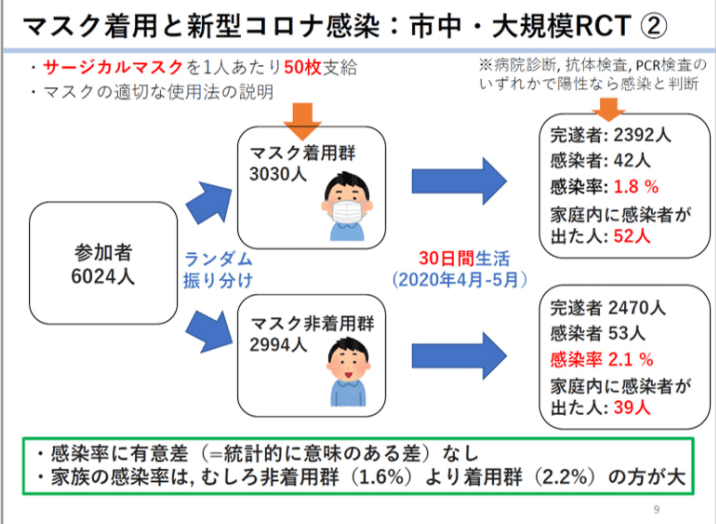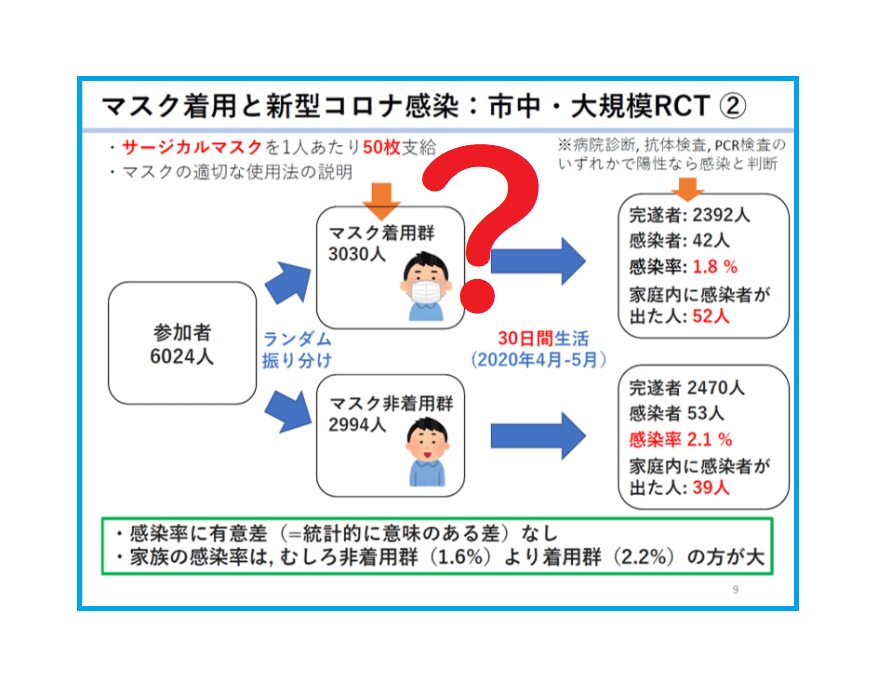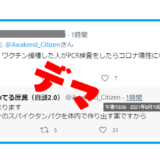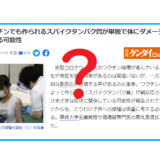デマの内容
次のような画像を出して

デンマークの6,000人規模のRCT(ランダム化比較試験)では、マスクの感染予防効果「無し」という結果だった。
家族の感染率は、むしろマスクをしていた人のほうが大きかった。
と主張する人がいますが、デマです。

デンマークで行われたこのランダム化比較試験(RCT = Randomized Controlled Trial)は通称「DANMASK-19」として知られています。2つの論説と共に2020年11月18日にAnnals of InternalMedicineに掲載されました(Effectiveness of Adding a Mask Recommendation to Other Public Health Measures to Prevent SARS-CoV-2 Infection in Danish Mask Wearers)。
結論
この調査は、次のような理由から、マスクの防御効果を否定するものではありません。
- この調査では家庭内でマスクを装着するという要件はありませんでした。
- この調査は、マスク装着グループと非装着グループの間で50%以上の防御効果を検出するよう設計されましたが、実際はその値に達しなかったため、この結果は偶然に生じた可能性があるとされています。
- マスク着用グループの一部は、マスク着用の指示を守っていませんでした。
- 当時のデンマークでは、ソーシャルディスタンス/群衆回避/手洗いなどの公衆衛生対策が実施されており、また、ウイルスが比較的少なかった4月と5月に調査が行われたため、マスク着用の防御効果を調べることが困難だったと考えられます。
- 調査時の有病率が低かったことを考えると、抗体検査でかなりの疑陽性が生じていた可能性もあります。
- 調査の執筆者達は「この調査結果は確実とは言えない」と述べています。
この調査が行われたのは2020年の4月~5月です。つまり情報としては古いと言えます。2020年の末から2021年にかけて、マスクには防御効果もあることを示す調査結果が続々と発表され続けています。
また、マスクの主目的は「感染症を他人にうつさない効果(飛沫を抑える効果)」ですが、この調査はその視点が欠けているため、この調査結果を引用して、まるで「マスクが無意味」であるかのように主張するのは不適切です。
詳細
ファクトチェック「Danish Study Doesn’t Prove Masks Don’t Work Against the Coronavirus (FactCheck.org)」からの抜粋です。
But scientists say that’s the wrong takeaway — and even the authors of the study say the results shouldn’t be interpreted to mean masks shouldn’t be worn.
(SNSなどでマスクが無意味だという話が拡散したことについて)科学者たちは「それは間違った解釈だ」と述べています — そしてこの調査の執筆者達も、この調査結果がマスクの着用を否定していると解釈されるべきではないと述べています。
The study didn’t identify a statistically significant protective effect for wearers, but the trial was only designed to detect a large effect of 50% or more. And the study didn’t weigh in on the ability of masks to prevent spread of the virus from wearers to others, or what’s known as source control, which is thought to be the primary way that masks work.
この調査では、マスク着用者に関して統計的に有意な防御効果は見られませんでしたが、この調査は50%以上の大きな防御効果を検出するように設計されたものです。 また、この研究では、マスクの主要機能と考えられるソースコントロール(マスクが他人へウイルスを拡散するの防ぐ能力)については考慮されていません。
As a result, the most that can be said is that this particular study, under the conditions at the time in Denmark, didn’t find that the face mask intervention had a large protective effect for wearers — not that masks provide no protection at all or don’t offer benefits to others.
その結果、最も言えることは、この研究は、当時のデンマークの状況下においてはマスクの着用が大きな防御効果を示さなかったということであり、マスクの防御効果がまったく無いということではなく、他人のためにならないというわけでもありません。
the authors specifically wrote that their findings were “inconclusive.”
著者達はこの調査結果が「確実なものではない」と明確に書きました
Again, the study only assessed the personal protective effect of a mask intervention, not the potential for masks to hamper spread of the virus to others.
繰り返しになりますが、この調査は、マスクが個人を防御する効果のみを評価しており、マスクが他人へウイルスをうつさない効果については評価していません。
Around 6,000 people who left their homes for at least three hours a day participated, with approximately half being given a box of 50 surgical masks and being told to wear a mask whenever outside of their homes, while the other half was not given masks or such a mask recommendation.
1日3時間以上外出をする約6,000人が参加し、その約半数に50枚のサージカルマスクの箱が渡され、外出時にはマスクを着用するように指示されました。残りの半数にはマスクが与えられず、マスクの装着も求められませんでした。
The study was conducted at a time when Danish authorities were not recommending masks to the general public, so most people both groups would encounter were not likely to be masked. Both groups were told to follow national public health guidance, which included physical distancing, avoiding crowds and washing hands.
この調査は、デンマーク当局が一般大衆にマスクを推奨していなかった時期に実施されたため、マスク装着グループおよび非装着グループのいずれも、接触する相手のほとんどはマスクをしていませんでした。両方のグループは、ソーシャルディスタンス、群衆の回避、手洗いなど、国の公衆衛生ガイダンスに従うように指示されました。
While fewer people in the masked group became infected — equivalent to an 18% reduction in risk — the difference was not statistically significant, meaning the result may have come about by chance.
マスク装着グループの感染率のほうが(非装着グループよりも)小さくなりましたが(リスクが18%減少したことに相当)、その差は統計的に有意ではありませんでした。つまり、この結果は偶然に生じた可能性があります。
It is important to emphasize that this trial did not address the effects of masks as source control or as protection in settings where social distancing and other public health measures are not in effect.
この調査は、マスクのソースコントロール(マスクが他人へウイルスを拡散するの防ぐ能力)について調べたものではなく、ソーシャルディスタンスや他の公衆衛生対策が実施されていたときに行われたことを理解する必要があります。
the trial was done in April and May when there was relatively little virus circulating in Denmark, which might have made it more difficult to pick up a protective effect of mask wearing.
デンマークで流行しているウイルスが比較的少なかった4月と5月に調査が行われたため、マスク着用の防御効果を調べることがより困難だった可能性があります。
Not everyone in the mask group followed through on the advice to wear a mask, either, with 46% of people self-reporting that they wore the masks “as recommended”; 47% “predominantly as recommended”; and 7% “not as recommended.”
マスク装着グループの全員がマスク装着の指示を守ったわけではありませんでした(46%が「指示通り」マスクを着用、47%が「ほぼ指示通り」着用、7%は「指示を守らなかった」と回答)。
Frieden and colleagues suggested that the antibody tests used to diagnose SARS-CoV-2 infection could have led to a fair number of false positives, especially given the low prevalence of the coronavirus at the time.
フリーデン博士(CDC ディレクター)らは、新型コロナウイルス感染の検査に使用された抗体検査が、特に当時のコロナウイルスの有病率が低かったことを考えると、かなりの数の偽陽性につながった可能性があることを示唆しました。(※検査の手段として、抗体検査/PCR検査/医師の診断が用いられました)
 ほえのブログ
ほえのブログ 

